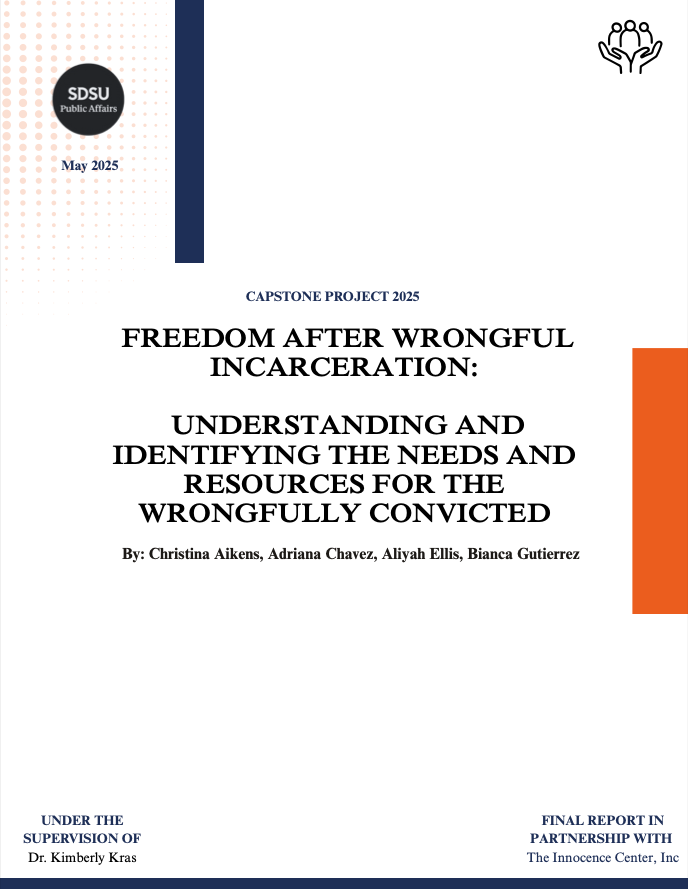Freedom After Wrongful Incarceration: Understanding the Path Home
The journey to freedom doesn’t end when prison doors open for the wrongfully convicted. A comprehensive study conducted by San Diego State University master’s students in partnership with The Innocence Center reveals the complex challenges faced by exonerated and paroled individuals as they rebuild their lives after wrongful incarceration.
The Reality of Reentry
Through interviews with 19 individuals who experienced wrongful conviction, this research illuminates a sobering truth: legal vindication is just the beginning of a long road to recovery. Unlike those released on parole, exonerated individuals often face an abrupt transition without the safety net of reentry services, case management, or transitional housing.
The study documents profound systemic failures that compound the trauma of wrongful imprisonment. Many participants were released without basic identification documents, making it nearly impossible to open bank accounts, apply for jobs, or access essential services. Employment barriers persist even after exoneration, as gaps in work history spanning decades raise questions from employers who may still harbor suspicions despite legal vindication.
The Hidden Costs of Injustice
Beyond practical obstacles, the psychological toll runs deep. Participants reported struggling with depression, anxiety, and PTSD while navigating a world that had moved on without them. The structured environment of prison, however harmful, gave way to overwhelming freedom without adequate preparation or support. Many described feeling “behind” their peers, having missed decades of technological advancement, social changes, and personal milestones.
Financial hardships add another layer of complexity. Even when compensation eventually arrives, the critical months immediately following release often leave individuals vulnerable to homelessness, debt, and instability. Some discovered they owed money on debts that accumulated during their wrongful imprisonment, creating additional barriers to rebuilding their lives.
Building Bridges to Recovery
The research identifies several key areas where targeted support can make a transformative difference:
Structured Case Management: A dedicated point of contact to guide individuals through the maze of reentry challenges, from securing identification to accessing healthcare and employment services.
Peer Support Networks: Connections with others who share similar experiences provide understanding that professional support alone cannot offer. The shared trauma of wrongful conviction creates unique bonds that facilitate healing and practical guidance.
Mental Health Integration: Trauma-informed therapy should be a standard component of reentry support, recognizing that the psychological impact of wrongful imprisonment extends far beyond release.
Life Skills Programming: Basic financial literacy, technology training, and navigation of modern systems become essential when returning to a world that has evolved significantly during incarceration.
Family Reunification Support: Relationships strained by years of separation require specialized attention to heal and rebuild trust.
The Innocence Center’s Role
Participants consistently highlighted The Innocence Center’s crucial support during their reintegration journey. Many described the organization as more than a legal advocate—as a lifeline providing emotional support, practical assistance, and a sense of community during their most vulnerable moments.
The study’s recommendations build on this foundation, proposing expanded services that address both immediate survival needs and long-term stability goals. These include partnerships with employers willing to provide direct job opportunities, streamlined access to public benefits, and comprehensive resource guides connecting individuals to services in real-time.
Moving Forward
This research contributes to a growing understanding that true justice extends beyond legal exoneration. It requires acknowledgment that the state’s failure to prevent wrongful conviction creates an obligation to support those harmed by these failures. The recommendations offer a roadmap for organizations, policymakers, and communities to create more effective support systems.
The voices captured in this study remind us that behind every exoneration statistic is a human being working to rebuild a life that should never have been interrupted. Their courage in sharing their experiences helps pave the way for more comprehensive, compassionate approaches to post-exoneration support.
This research was conducted by Christina Aikens, Adriana Chavez, Aliyah Ellis, and Bianca Gutierrez under the supervision of Dr. Kimberly Kras at San Diego State University.


